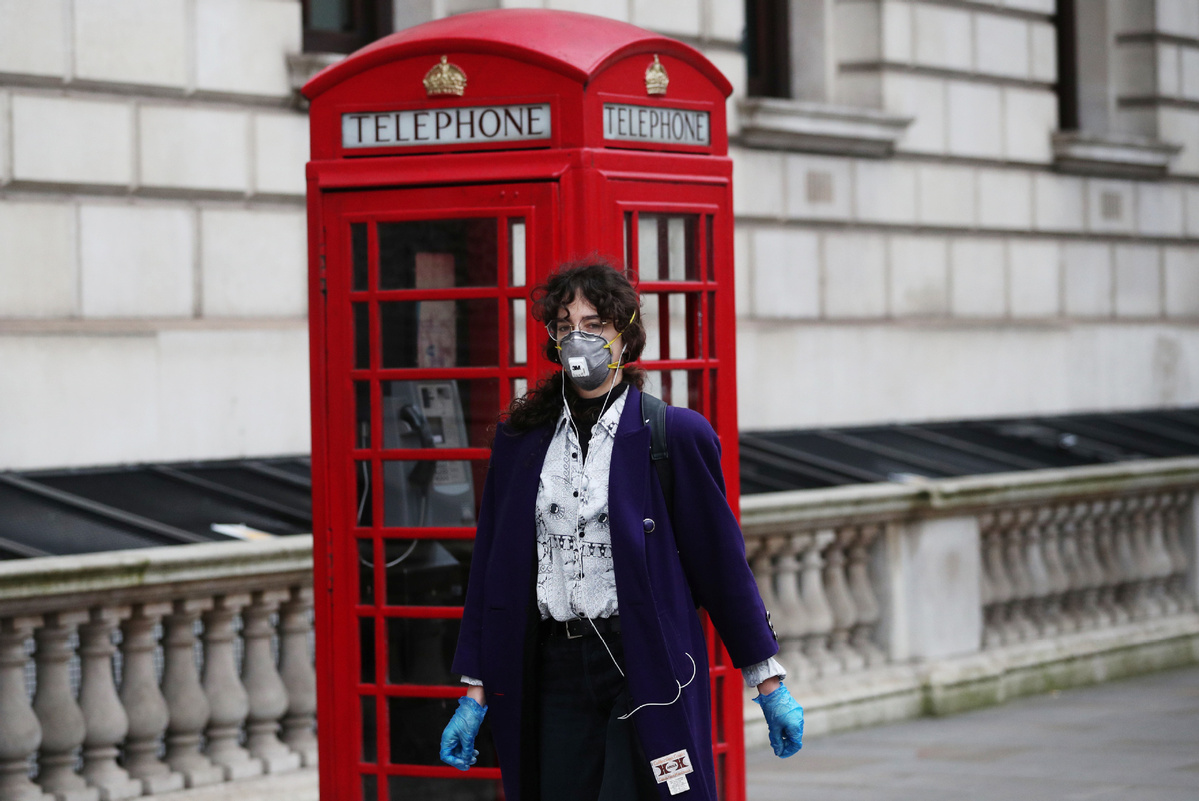
A woman wearing a protective face mask and gloves in Westminster as the spread of the coronavirus disease (COVID-19) continues, in London, March 18, 2020. (Photo: Agencies)
Life should not feel normal, Sturgeon warns Scots, as calls for lockdown rise
The United Kingdom's death toll from the novel coronavirus reached 335 on Monday, an overnight increase of 54, as Prime Minister Boris Johnson came under increasing pressure to follow the lead of many European leaders and put the country into lockdown.
Johnson's regular afternoon media briefing was delayed until later in the evening because of on-going high-level discussions about the country's attempts to deal with the outbreak, as the death toll increased.
Speaking earlier in the day, Scotland's First Minister Nicola Sturgeon adopted a direct approach, after a weekend that saw many people continuing to ignore advice about social distancing.
"I want to repeat what I said yesterday: life shouldn't feel normal for you right now," she said. "If it is, you're not doing the right things." She went on to say that shops providing anything other than essential items, such as food and medicine, should now close.
A total of 14 people in Scotland have now died from the virus, and the country's Chief Medical Officer Catherine Calderwood said each one probably represented around 1,000 further infections.
"We have 23 people currently in our intensive care units across Scotland who have coronavirus and each of them represents perhaps 400 to 500 other people that will have become infected in the course of their illness," she added.
A warning of what might lie ahead for the UK came when a Ministry of Defence representative said London's ExCel Arena exhibition venue could be taken over by the National Health Service as a makeshift field hospital.
"To assist NHS England to prepare for a number of scenarios ...military planners visited the ExCeL center ... to determine how the center might benefit the NHS response to the outbreak," a spokesperson told the London Evening Standard.
Meanwhile in Westminster, Parliament began debating emergency powers legislation to help the government in its fight against the outbreak.
After opposition complaints, the bill has been amended from a two-year period to being on a six-month, renewable basis, and it contains what Health Secretary Matt Hancock called powers "never seen before in peacetime", but "proportionate to the threat we face".
Under the legislation, officials would be able to shut airports and detain people on public health grounds, and immigration officials could put people in isolation.
Elsewhere, the mayor of Bergamo, the Italian city at the epicenter of the country's outbreak, has told Sky News he wants his daughters who are studying in England to return home as they will be safer there, because of the British government's handling of the crisis.
"I think that even if we are at the center of the epidemic, they are probably more secure here than in England," said Giorgio Gori. "I don't understand why the government didn't decide in time to protect the citizens."
Denmark, which so far has reported more than 1,300 coronavirus cases and 13 deaths, has extended its national lockdown for another two weeks, meaning schools, bars, gyms and other public facilities will remain shut until April 13.
In Germany, Chancellor Angela Merkel has tightened curbs on social gatherings to just two people in a bid to contain the outbreak, telling the nation in a televised address that "our own behavior" was the "most effective way" of slowing the spread of infection.
"The great aim is to gain time in the fight against the virus," she added.
Merkel herself then entered quarantine, after a doctor who gave her an unrelated vaccination last week tested positive for the virus.
So far during the outbreak, Germany, Europe's largest economy, has confirmed 18,610 cases and 55 deaths. Latest figures suggest that Germany's approach to dealing with the outbreak is working, as the infection curve, which shows the rate of increase in the number of cases, seems to be becoming less steep.
"We are seeing signs that the exponential growth curve is flattening off slightly," said Lothar Wieler, president of the Robert Koch Institute for disease control.
"But I will only be able to confirm this trend definitively on Wednesday. But I am optimistic that the measures are already having an effect, which is very early because they have only been in place for a week."
The on-going crisis has also caused a crimewave, with people producing fake medical, hygiene and personal protection products.
In the UK a 59-year-old man has appeared in court charged with making fake prevention kits, having been arrested following a tip-off from police in the United States.
The European Union's anti-fraud office Olaf has published photos of fake masks designed for children that are being smuggled into and sold in the bloc.
Italy's La Repubblica newspaper reported that 680,000 masks and respirators sent by China to the Red Cross in Italy were mistakenly impounded by Czech customs authorities who thought they were being illegally smuggled.
The Czech Republic sent 110,000 facemasks to Italy on Monday after confusion around a larger shipment of gear to protect against the virus was impounded by Czech authorities last week, Reuters reported.


